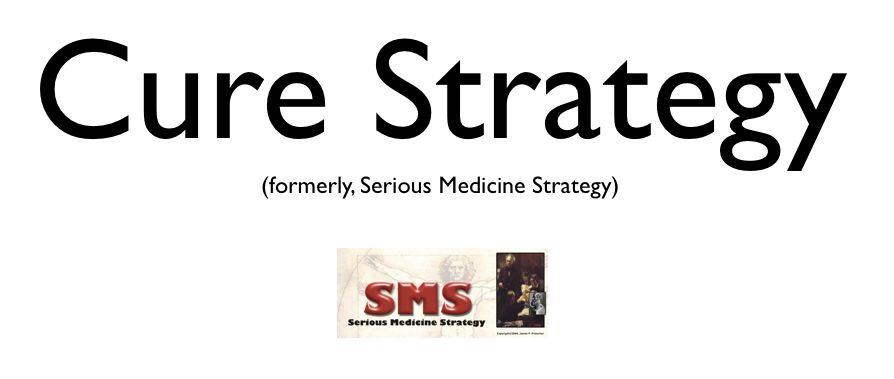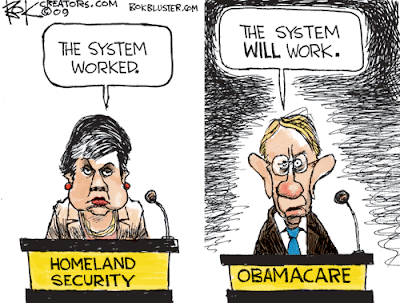
“Poll shocker: Scott Brown surges ahead in Senate race”--that’s the
headline in
The Boston Herald this morning, showing Republican newbie
Scott Brown ahead of Democratic establishmentarian
Martha Coakley. Is it really possible that the Democrats could lose a Senate race in the Bay State for the first time since 1962? And lose the Senate seat held by a Kennedy for 54 of the last 57 years? We’ll know Tuesday.
We shouldn’t underestimate the power of determined Democrats to hang on to that seat, not only for the sake of Massachusetts, but also for the sake of the 60 votes that they need in the Senate to pass Obamacare. (
Ben Nelson of Nebraska must be sick at the thought that maybe he threw away his career and still won’t even get the bill he sold his political soul for.) But even if Coakley wins in Massachusetts, the message is clear: The Democrats have misplayed their hand--they focused on healthcare, when they should have focused on the economy.
But don’t take my word for it. Here’s Rep.
John Larson (D-CT), the fourth-ranking Democrat in the House, was surprisingly blunt in
The Washington Post this morning:
Look, as important as health care is, and as front and center as it is in the Beltway, when I go home . . . they care about health care, but they're focused on jobs. They know without a job, there's not an awful lot of hope of them getting health care.Hmmm. Could it be that some people in Washington care more about political power--the transformation of one-sixth of the US economy, at their behest--than about jobs for ordinary folks?
Indeed, the latest
Fox News/Opinion Dynamics poll confirms a point that’s been obvious for the last year: The economy trumps everything else. When Americans were asked to choose the “ONE” issue that they want President Obama to focus on, “the economy and jobs” was ranked first, at 48 percent, as we can see from the screen-grab above. By contrast, “health care” was a distant second, at 12 percent. (“Terrorism and national security” came in third, at 11 percent, although that number would have spiked if the Christmas Day underwear bomber had succeeded in his deadly plot.)
And so the Obamans made a "collossal miscalculation," in the words of fair-minded
political analyst Charlie Cook, who added this:
The latest unemployment and housing numbers underscore the folly of their decision to pay so much attention to health care and climate change instead of focusing on the economy “like a laser beam,” as President Clinton pledged to do during his 1992 campaign. Although no one can fairly accuse Obama and his party's leaders of ignoring the economy, they certainly haven't focused on it like a laser beam.We might add that
Bill Clinton focused “like a laser beam” on the economy during the 1992 campaign, which he won in a landslide. And yet then, many of the same people guiding the Obama administration persuaded the 42nd President to focus instead on “healthcare policy” once he took office in 1993. And we all know what happened in 1994.
So does that mean that healthcare is unimportant? No. But it does mean that the current model of healthcare is unimportant, not only because it’s a bad model, but because it is profoundly unpopular. The Democrats would be better off without it. But common sense tells us that health is extremely important. For everyone who prays, or wishes, or hopes to find a job, there are 10 who are praying, or wishing, or hoping for good health and wellbeing. Health, as opposed to “healthcare policy” is central to everyone’s existence. One could say that health--defined, once again, as physical wellness--is the ideology at the base of all other ideologies. It’s as if Democrats, conscious of the importance of health, as we all are, journey into a policy funhouse, where some sharpy convinced them that the natural human interest in health should somehow be transmuted into an unnatural interest in bureaucratic control over health. It was a con game of monumental proportions.
The point is this: The American people, like all people, want more health, not less. And that means that they want more healthcare, which is a pretty good proxy for health. Those who say that “healthcare” is not always the same as health have a strong case to make--e.g. that good diet and exercise is a more important variable for most than the last medical treatment--but they can’t make that argument if such an argument is seen as a front for rationing schemes of one kind or another. That is, if experts wish to argue that people should live a healthier lifestyle, that’s a message that Americans will, over time, gratefully receive. But if that “eat your spinach” message is coupled with the message of “let’s put a bureaucrat between you and your doctor,” well, fuhgeddaboutit. Americans might pick up a copy of
Men’s Health, or
Women’s Health, but they won’t want to empower Uncle Sam to make decisions for them, especially when he makes it clear that he wants them to have less healthcare. Such rationing schemes, especially if they are run by the government, will soon enough be regarded as “death panels,” and so healthcare will sail off into a whole ‘nother darker direction. In a small “d” democratic country, voters will never vote for their own demise.
Moreover, properly considered, healthcare is not separate from the economy, healthcare is part of the economy--a crucial part. The healthcare sector is already the largest employer in the US. And for decades, it has been one of the fastest-growing sectors. Isn’t that what we need right now: fast-growing employment sectors? Especially fast-growing economic sectors that can attract sick people, and healthy capital, from around the world? Isn’t that the very definition of a win-win?
Instead, the Democrats’ argument has been that in order to grow the overall economy, we must first shrink the healthcare economy. That is, toss away the bird in the hand for the recovery in the bush. Or, to mix a metaphor, we must bail out the boat, but first we must knock another hole in the hull.
As a matter of economic strategy, the Obamans should have seen healthcare as the golden goose--a goose to be cherished and replicated, not throttled. But instead, 30s-style social democrats joined up with 70s-style neo-Malthusians to come up with a solidarity-and-scarcity plan that nobody wants. What the Democrats needed was another intellectual system from the 30s: Keynesianism. Don’t worry about National Recovery Act-type solidarity, which was a dud, anyway. Focus, laserlike, on productive economic activity. In the 30s, that meant roads and rural electrification. Today, it would mean medical technology. And then, lo and behold, not only would the economy revive, but people would be healthier. Once again, a win-win.
As noted here in the past, the American people want more, not less. And that includes the latest in technology: The Obamans are tight with Silicon Valley, but there is no sense, in the current plan, that they have learned any lessons about user-friendliness, or transparency, or all-around “coolness.” In a world of iPhones, Droids, and Nexus Ones, the Democrats have been offering rotary phones and landlines.
Most of us have no idea what a “Google” or “Apple” approach to healthcare would look like--because Google and Apple are working on phones and computers and many other areas. Nobody in power seems interested in how the visionaries who run those companies would approach the issue of getting everyone better health. Note: not “health insurance,” but health.
So of course the “Cadillac Tax” on healthcare plans, which would have fallen heavily on blue-collar workers--has been exiled to out-year oblivion. Labor chiefs might be locked into the 30s social-democrat model, but they are not locked into the Malthusian model. So even if Obamacare somehow gets through (and that looks less and less likely), the Cadillac Tax is a goner. To repeat, the American people want more, not less. And from a policy point of view, if you want to grow the economy, you don’t begin by shrinking it.
We can close with the distinct possibility of a grand cosmic joke--it’s possible that the election that sinks healthcare will be the special election to fill the seat of the late
Teddy Kennedy. So Kennedy, who spent almost forty years pushing for healthcare legislation--after booting away the chance in 1971, some say, because he didn’t want Republican Richard Nixon to get the credit--might now be replaced by a Republican who has pledged to the tea-partiers that he will throw Obamacare into Boston Harbor. A joke that's funny to some, and not funny to others.
But that’s my Boston--when you least expect it, the patriots up there do something big that surprises you.















